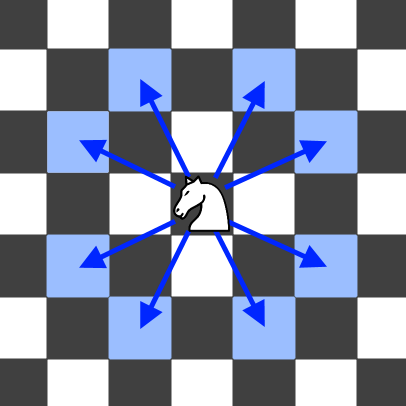In an infinite chess board with coordinates from -infinity to +infinity, you have a knight at square [0, 0].
A knight has 8 possible moves it can make, as illustrated below. Each move is two squares in a cardinal direction, then one square in an orthogonal direction.

Return the minimum number of steps needed to move the knight to the square [x, y]. It is guaranteed the answer exists.
Example 1:
Input: x = 2, y = 1 Output: 1 Explanation: [0, 0] → [2, 1]
Example 2:
Input: x = 5, y = 5 Output: 4 Explanation: [0, 0] → [2, 1] → [4, 2] → [3, 4] → [5, 5]
Constraints:
- |x| + |y| <= 300
BFS 로 찾을 수 있다. 하지만 그냥 BFS 를 수행했을시, TLE 에 걸리게 되며 1사분면만 찾도록 하는 최적화를 했더니 통과가 되었다.
더 빠른 DP 솔루션도 있는듯 하나.. 이 부분은 나중에 시간되면 봐야지.. 패스!
import java.util.*;
public class MinimumKnightMoves {
static int [][] directions = {
{-2, -1},
{-2, 1},
{-1, -2},
{-1, 2},
{1, -2},
{1, 2},
{2, -1},
{2, 1}
};
public int minKnightMoves(int x, int y) {
// 1사분면만 탐색하게 해준다.
x = Math.abs(x);
y = Math.abs(y);
Point start = new Point(0, 0);
Set<Point> visited = new HashSet<>();
visited.add(start);
Queue<Point> q = new LinkedList<>();
q.add(start);
int step = 0;
while (q.isEmpty() == false) {
int size = Integer.valueOf(q.size());
for (int i = 0; i < size; i++) {
Point point = q.poll();
if (point.y == y && point.x == x) {
return step;
}
for (int [] dir : directions) {
Point next = new Point(point.y + dir[0], point.x + dir[1]);
// For example, to reach (1,1) from (0, 0), the best way is to get (2, -1) or (-1, 2) first, then (1,1) (two steps).
// If we eliminate all coordinates with negative numbers, then we can't reach (1,1) from (0, 0) within two steps.
if (visited.contains(next) == false && next.y >= -1 && next.x >= -1) {
q.add(next);
visited.add(next);
}
}
}
step++;
}
return -1;
}
static class Point {
int y;
int x;
public Point(int y, int x) {
this.y = y;
this.x = x;
}
@Override
public boolean equals(Object o) {
if (this == o) {
return true;
}
if (o == null || getClass() != o.getClass()) {
return false;
}
Point point = (Point)o;
return y == point.y &&
x == point.x;
}
@Override
public int hashCode() {
return Objects.hash(y, x);
}
}
}'Algorithm' 카테고리의 다른 글
| 3. Longest Substring Without Repeating Characters (0) | 2021.01.14 |
|---|---|
| [Leetcode] 443. String Compression (0) | 2020.12.28 |
| 1283. Find the Smallest Divisor Given a Threshold (0) | 2020.12.26 |
| [Leetcode] 1396. Design Underground System (0) | 2020.12.22 |
| [Leetcode] 381. Insert Delete GetRandom O(1) - Duplicates allowed (0) | 2020.12.20 |
